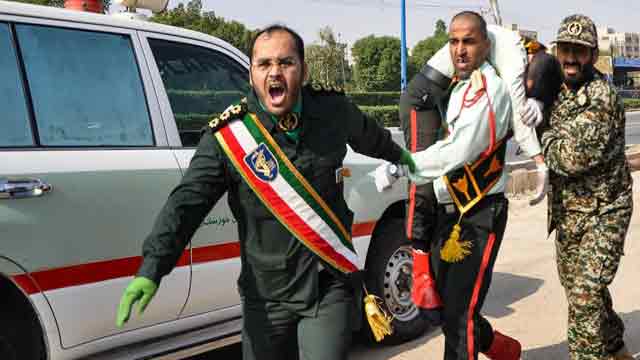Tehran, Sep 22 (Just News): Gunmen fired on a military parade in southwestern Iran on Saturday, killing 24 people, half of them members of the Revolutionary Guards, state news agencies reported, in one of the worst attacks ever on the elite force.
State television said the assault, which wounded more than 60 people, targeted a stand where Iranian officials had gathered in the city of Ahvaz to watch an annual event marking the start of the Islamic Republic's 1980-88 war with Iraq.
An Iranian ethnic Arab opposition movement called the Ahvaz National Resistance claimed responsibility for the attack. All four attackers were killed. Islamic State militants also claimed responsibility. Neither claim provided evidence.
Women and children also died in the violence, state news IRNA agency quoted an unnamed official source as saying.
The Islamic Revolutionary Guards Corp (IRGC) have been the sword and shield of Shi'ite clerical rule since Iran's 1979 Islamic Revolution. The Guards also play a major role in Iran's regional interests in countries such as Iraq, Syria and Yemen.
A video distributed to Iranian media showed soldiers crawling on the ground as gunfire blazed in their direction. One soldier picked up a gun and got to his feet as women and children fled for their lives.
WHERE DID THEY COME FROM?
A video on state television's website showed confused soldiers at the scene of the attack. Standing in front of the stand, one asked: "Where did they come from?" Another responded: "From behind us."
The bloodshed struck a blow to security in OPEC oil producer Iran, which has been relatively stable compared with neighbouring Arab countries that have grappled with upheaval since the 2011 uprisings across the Middle East.
State television blamed "takfiri elements", a reference to Sunni Muslim militants, for the attack. Ahvaz is in the centre of Khuzestan province, where there have been sporadic protests by minority Arabs in predominantly Shi'ite Iran.
An Iranian military spokesman said the gunmen were trained by two Gulf Arab states and had ties to the United States and Israel.
"These terrorists... were trained and organised by two ... Gulf countries," Brigadier General Abolfazl Shekarchi told the official news agency IRNA.
"They are not from Daesh (Islamic State) or other groups fighting (Iran's) Islamic system ... but they are linked to America and (Israel's intelligence agency) Mossad."
Iran has suggested in recent weeks that it could take military action in the Gulf to block other countries’ oil exports in retaliation for US sanctions intended to halt its sales of crude.
DOMINANT MILITARY FORCE
The Revolutionary Guards are the most powerful and heavily armed military force in the Islamic Republic and also have a vast stake worth billions of dollars in the economy.
Kurdish militants killed 10 Revolutionary Guards in an attack on an IRGC post on the Iraqi border in July, Iran's semi-official Tasnim news agency reported, the latest bloodshed in an area where armed Kurdish opposition groups are active.
Iran will be scrambling to determine the motives for the Saturday's high-profile attack as it faces growing US pressure.
President Donald Trump decided in May to pull the United States out of the 2015 international nuclear deal with Tehran and reimpose sanctions in a bid to isolate the Islamic Republic.
Trump will fail in his confrontation with Iran, just like Iraq’s Saddam Hussein, Iranian President Hassan Rouhani said, referring to the war in the 1980s between the two Middle Eastern powers and vowing that Tehran will not abandon its missiles.
Tensions between mainly Shi'ite Iran and mostly Sunni Saudi Arabia have surged in recent years, with the two countries supporting opposite sides in wars in Syria and Yemen and rival political parties in Iraq and Lebanon.
Attacks on the military are rare in Iran.
Last year, in the first deadly assault claimed by Islamic State in Tehran, 18 people were killed at the parliament and mausoleum of Ayatollah Ruhollah Khomeini, the founder and first supreme leader of the Islamic Republic.Reuters
(Justnews/ys/1800hr)





